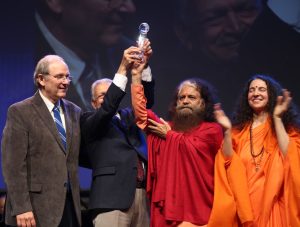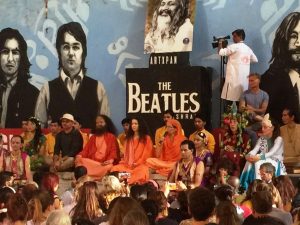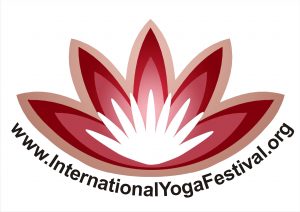The life and time of on the most influential Spiritual Leader: H.H. Pujya Swami Chidanand Saraswatiji President of the International Yoga Festival Rishikesh
H.H. Pujya Swami Chidanand Saraswatiji invites you to join him at the IYF 1-7 March 2019. Register Now: https://www.internationalyogafestival.org/register/
“Welcome Home!” – this greeting is offered to every guest and visitor to Parmarth Niketan Ashram, a true spiritual haven, lying on the holy banks of Mother Ganga in the lap of the lush Himalayas. “Parmarth Niketan” literally means “Dedicated to the Welfare of All.” A friendly welcome and this simple mission statement expand into a vast array of programs and services that are led by or inspired by or driven by, or a combination of the three, the ashram. The ashram runs schools, hospitals, ecological programs and disaster-relief projects with no discrimination on the basis of caste, color, creed, gender or nationality.
I first came to Parmarth Niketan in 2013 on a spiritual adventure, attending the International Yoga Festival. I was hooked – Home! One of the aspects of Parmarth most attractive to me is the charity work. Pujya Swamiji says, “it’s culture, nature, and future” – a culture of love and togetherness, focused on our common nature and this one planet we share, to create the future we desire. This vision is further unfolded in the programs and efforts of the ashram or that are associated with Parmarth. This year I made the personal decision to move to India, to live at the ashram as a sevak, in service to the vision and mission of Pujya Swamiji and the ashram’s various programs.
His Holiness, Pujya Swami Chidanand Saraswatiji serves as President and Spiritual Head of Parmarth Niketan Ashram. Pujya Swamiji selflessly and tirelessly uses every moment as an opportunity to give and to teach others the gift and value of giving. Every day you will find him participating in a multi-variety of activities: Meeting with government officials, faith leaders, and devotees; leading spiritual ceremonies and community programs; offering darshan and inspiring words; and chanting at the inspiring Ganga Aarti celebration held each evening on the banks of the sacred Ganga River in Rishikesh. From His example, countless others are inspired to action in their own communities in the areas of healthcare, education, the environment, and social justice.
The purpose of this story is share with you some of the charitable work of the ashram, seeking to inspire you to make a difference, and perhaps sparking a fire in you to serve in some way or even to come visit us at Parmarth in Rishikesh, India. I have aligned the work with Swamiji’s theme of “culture, nature, and future”.
From a cultural perspective, Pujya Swamiji is part of a global effort to bring faith leaders together for a more peaceful, healthy and sustainable world – a cultural approach for change that is all about nature – the Interfaith Humanitarian Effort. In addition to faith leaders, the ashram brings together Entertainers for Peace, where the stars are inspired to shine for a more peaceful world.
Entertainers have a unique position and opportunity to influence peace and Swamiji challenges them to rise to the occasion. Efforts to bridge business leaders and political leaders are also a piece of the cultural change efforts – all in the name of peace. Lastly, Pujya Swamiji led a labour of love and intellect to create the Encylopedia of Hinduism, sharing one of the most beloved and lasting gifts of the Indian people to the world. The encyclopedia is 11 volumes of more than 7000 entries from over 1000 scholars, bringing together hindu history, scholarship, and contributions to the development of the world. We are One culture, One world – a world that is about Love and Togetherness – if we choose it to be.
Nature is fascinating, complex, ever-changing, and an endless opportunity to see ourselves in relationship to the world around us. Since coming to the ashram, I have learned of some drastic predictions coming from the United Nations around water, global warming, and the impact of food choices on the health of people and our earth. The ashram’s goal is to awaken us all to the difference we make and the changes required. The ashram’s efforts begin at home here in India, where Pujya Swamiji inspires India’s leaders for a clean and green India and a more peaceful world. The ashram’s specific programs include the Global Interfaith WASH Alliance (GIWA.org), the world’s first initiative to engage the planet’s many faiths as allies in efforts to create a world where every human being has access to safe drinking water, improved sanitation and proper hygiene.
Nothing short of a behavior change revolution is require to insure health, sustainable WASH for nearly half of India’s population. One of my favorite signs here at the ashram is for the World Toilet College, providing classroom and outreach trainings that cover the entire range of sanitation projects. Plus, there’s WASH on Wheels which brings dedicated social workers, volunteers and performers to all areas of India; the WaterSchool used to train and motivate teachers and students to learn the principles of sustainable water, sanitation and hygiene in order to be agents of social change; and Women for WASH which seeks to develop women entrepreneurs against pollution, hardship and disease right in their own neighborhoods and villages.
I am much more aware today of the significant role women can and do play in making change for the health of communities and our planet – and nature and culture balance and support one another. The Divine Shakti Foundation (DSF) is dedicated to the holistic well being of women, their children, and orphaned/abandoned children, and to all of Mother Nature and Mother Earth. Again, to make is personal, Menstrual Hygience Management was not on my radar screen before getting involved with Parmarth – it is now and the solutions are so simple – but they require me to think differently and to act differently. Creating a clean, green, and serene world means everyone is supported and barriers to health and wellness are removed. The Ashram’s efforts in these areas includes Gurukuls (schools) and Orphanages, education, and a Rural Development Program. There are programs such as Project Give-Back: The Heart of Healing, a health care program with annual free health care camps in Rishikesh.
Nature is a key element to understanding ourselves and I am convinced that any personal spiritual journey requires me to consider nature. What I understand today is that my relationships to people, to Mother Nature, to communities, is beyond borders and boundaries, and beliefs and ideals. It’s a matter of the heart – and about sameness and connection. Hope is our hands, and programs like Ganga Action Parivar (GAP) raise awareness about the need for collective and holistic, solution-based action to address the crucial issues facing the holy river Ganga. And Ganga broadens beyond this sacred river in India to encompass all rivers, all sources of water, all peoples. Briefly, Pujya Swamiji speaks of environmental preservation and 6 T’s: Toilets, Trash, Taps, Tigers, Trains, Trees – you can visit the ashram website to learn more how each of these has an impact on nature, and is influenced by culture and affects our future.
The final call in Pujya Swamiji’s vision is for the future. I think this is where the personal call most comes in – what future do I want? Knowing what I know now, how do my choices change? Choices around water, food, material possessions, care for my body, community, world – and those around me. It’s an interesting path – one that I find support along the way from the community here at Parmarth, through yoga and meditation, and through meeting amazing people from around the world who are involved in the change. So my last thought is – who do I surround myself with? How do I use my senses – what do I watch? what do I listen to? how do I touch? what do I allow my mind to gravitate towards? Ask yourself these questions – and perhaps our paths will cross as walk the path of “culture, nature, and future”.
I feel a sense of pride and I draw inspiration from these programs and initiatives, being called to make a difference in the world. Change really does depend upon each of us – it is a matter of the heart – the heart of me, the heart of you, the collective Heart of one earth! And for me, through the Heart of the One – the Divine – “any name, any form, no name, no form” – together we can. “Welcome Home!”
You can learn more about the ashram’s charitable mission and projects by visiting www.parmarth.org
Article by Ed Fink a sevak at Parmarth Niketan Ashram, Rishikesh (Himalayas), India.



